Dentures – Montpelier, VT
Putting New Teeth in Place
There are various types of tooth replacement available on the market, but the one that stands the test of time is dentures in Montpelier . As dentistry has advanced over the years, the material used to create these prosthetics makes them more appealing and natural-looking than those created centuries ago. At River Station Dentistry, our team of professionals is here to help you feel good about the way you look while also making it easier to eat, smile, and speak so that you can embrace all that life has to offer. Call us today to learn more about how we can help you smile again.
Who is a Good Candidate for Dentures?
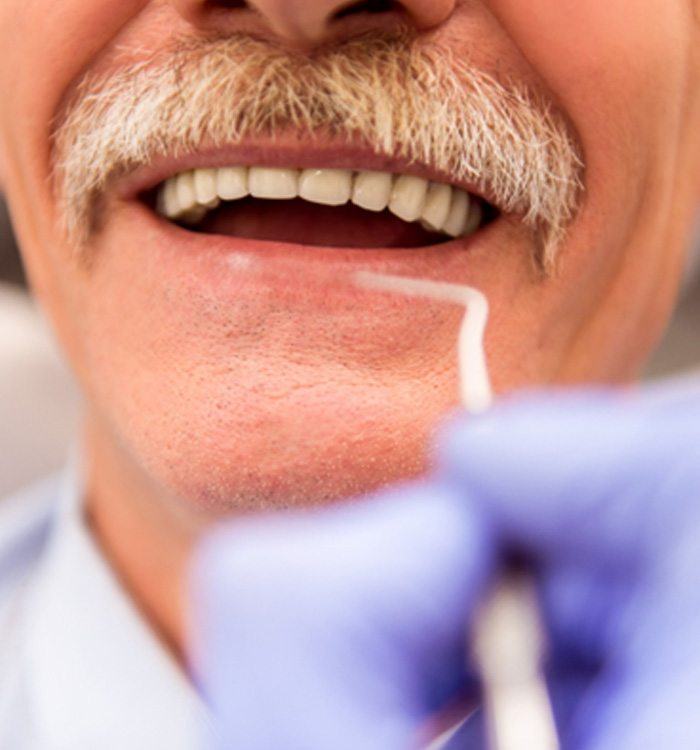
Knowing whether you are a good candidate for dentures requires scheduling a consultation with a member of our team. If you’re missing multiple teeth along the upper or lower arch, you will likely be recommended for a partial denture. However, none of your natural teeth remain, a full denture will be the suggested treatment option.
Of course, there is always the potential for an implant denture as long as you do not lack the necessary jawbone density to support your new smile.
During your consultation, we will thoroughly examine your smile to find out if you need any preliminary treatments that are designed to address signs of gum disease, tooth decay, or low jawbone density.
Types of Dentures
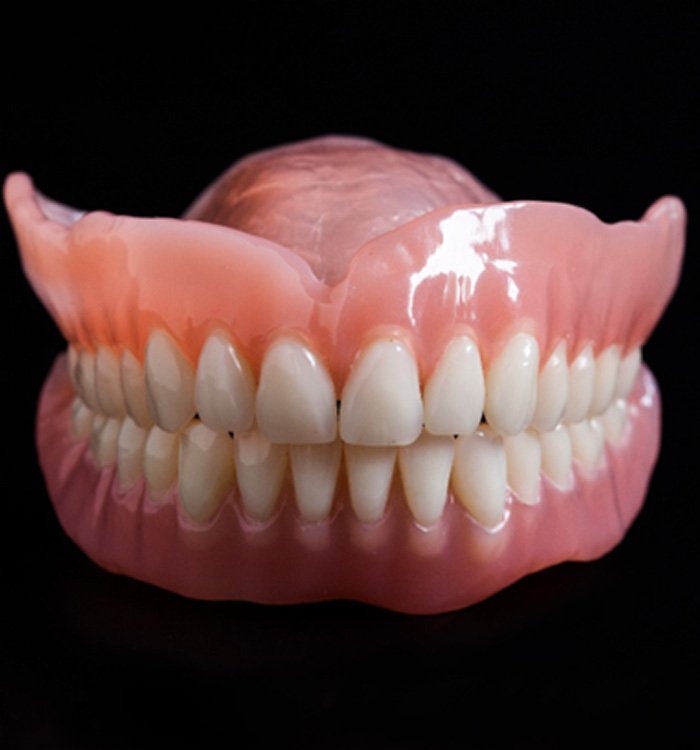
There are three types of dentures you can choose from. When meeting with your denture dentist, you will learn more about each:
Partial Dentures
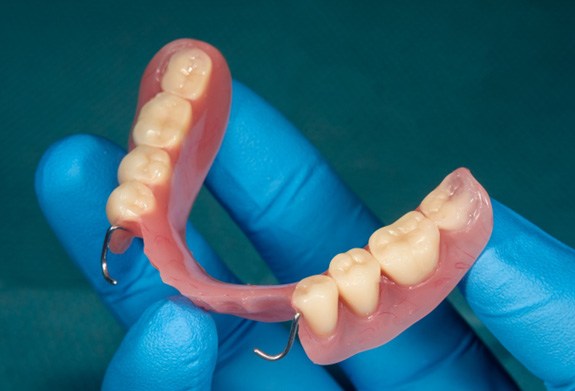
Partial dentures are used if you are missing multiple teeth along an arch. They do not have to be next to each other, as these prosthetics act like puzzle pieces. Made from acrylic and designed to blend in with the natural gum tissue, the artificial teeth are positioned appropriately so that when attached to natural teeth (with metal clasps), they fit over the vacant sockets to create a complete smile.
Full Dentures
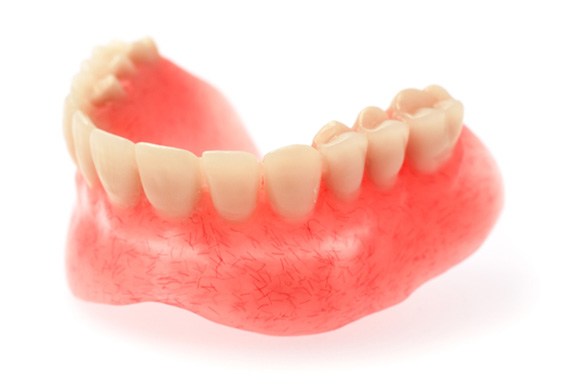
Full dentures are made to replace an entire arch of teeth. Held into place with suction, you can also apply denture adhesive for added security. Full dentures are commonly made from the same material as partial dentures, including the gum-colored base. The artificial teeth mimic natural tooth enamel, so they look like regular pearly whites, allowing you to smile confidently and eat some of your favorite foods.
Implant Dentures
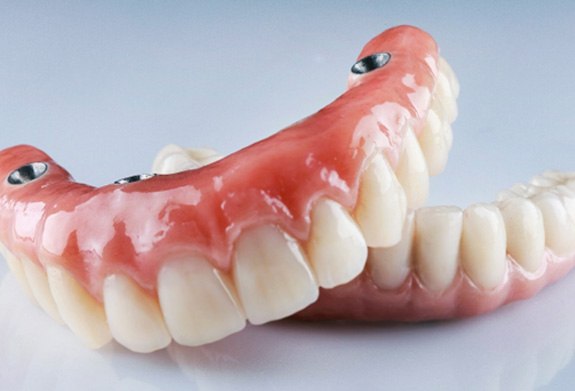
Implant dentures are frequently recommended by professionals because of their permanence and longevity. Held into place with titanium posts that are secured to the jawbone and fuse through a process known as osseointegration, these root-to-crown teeth can support custom-made dentures for 30+ years. This makes them a preferred choice among many patients suffering from tooth loss.
The Benefits of Dentures

There are different types of dentures, all with unique benefits and drawbacks. Our team at River Station Dentistry can help you determine what type of denture will best fit your needs and provide you with the most life-changing benefits. From being able to eat a greater variety of foods to enjoying a confidence boost that has you inspired to socialize more, dentures are truly priceless thanks to the countless advantages they bring to the table.
Psychological Benefits

Research shows that there is a correlation between tooth loss and anxiety and depression. With time, missing most or all of your teeth in a row can impact all areas of your life, from your personal and professional relationships to your oral and overall health. When you restore your smile, whether you opt to do that with traditional or implant dentures, you can regain a set of teeth that you feel proud to let show once again.
Clearer Speech

Gaps between teeth can lead to speech impediments like lisps and even create whistling sounds when you talk. This is due to air being pulled through small holes in the mouth caused by tooth loss or the tongue becoming stuck in these spaces as you speak. With a complete set of teeth, you can drastically minimize the frequency and severity of these speech problems.
Wider Variety in Diet

Just like difficulty speaking, another predominant life impact of moderate to severe tooth loss is the inability to eat different foods, especially those that are chewier. Dentures in Montpelier can restore your ability to easily chew important proteins, like chicken, as well as other foods that you may miss eating! As a result, you’ll likely find that you’re able to eat more nutritious meals.
Boosted Oral Health
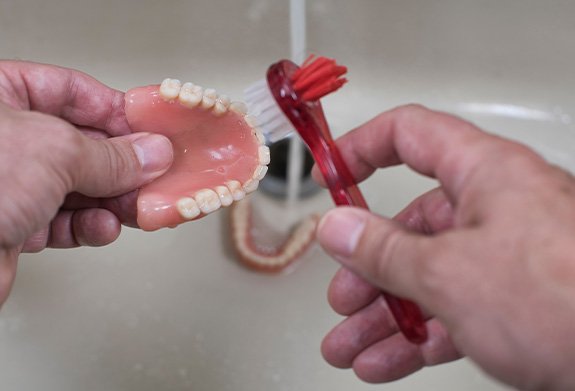
Tooth loss has been shown to lead to a variety of additional oral health concerns, including further tooth loss. By filling the gaps in your smile with a partial denture, you could boost your dental health by minimizing your risk of developing gum disease, cavities, and other common issues.
Higher Self-Confidence

Along with a whole and healthy smile comes greater self-confidence. If you have an important upcoming interview, life event, or first date, you can go into it feeling more comfortable with your smile and leave the first impression you were hoping for!
Dentures Aftercare

Your new dentures can help transform the appearance and function of your smile. However, even if you have few or no remaining natural teeth, it doesn't mean you should stop visiting your dentist. You should still attend regular checkups for a variety of reasons. Your dentist will continue to monitor any remaining natural teeth as well as your gum tissue. They will also keep an eye out for any abnormalities that could indicate oral cancer. When you wear dentures, it can be very difficult to notice these types of changes on your own, and early detection from your dentist can be the key to making a full recovery.
Removeable Dentures

Remove After Eating
After each meal, be sure to remove and rinse off your dentures. Doing this will help prevent buildup of food debris and plaque and keep your dentures looking, feeling, and smelling their best. Never use hot water to clean them, as the heat can warp the denture material and cause them to stop fitting properly.
Clean Your Restoration
It is important to completely remove your dentures from your mouth to clean them. Using a soft-bristled toothbrush and a small amount of unscented hand-soap, mild dish soap, or denture cleanser, gently brush your dentures. Never use regular toothpaste, as your dentures were not made to stand up to abrasive products.
If you won’t be wearing them again right away, gently submerge them in a container of water or denture soak so they don’t dry out and lose their lose their shape.
Always be sure to rinse your dentures well before putting them back in your mouth, as these cleansing materials were not meant to be ingested.
Keep Your Dentures Safe
When cleaning your dentures, be sure to place a towel underneath them just in case you accidentally drop them. You can also fill your sink basin with water for added cushioning. These safeguards will reduce the risk of them becoming damaged on impact.
When not in use, store your dentures out of reach of small children and pets.
Remove When You Sleep
Always remove your dentures each night when you go to bed. Wearing dentures restricts the circulation in your gums, leading to painful soft-tissue irritation. Sleeping with dentures has also been associated with an increased risk of pneumonia as well as higher levels of gum and tongue plaque.
Store your dentures in a glass of water or denture soak overnight. If you allow them to dry out, they can permanently lose their shape and will need to be replaced.
Notice Changes
Be mindful of any changes in your mouth so you can bring them up with your dentist. This includes any mouth sores, irritation, or signs of oral infection.
Should your dentures become damaged, never attempt to repair them on your own, as you could accidentally damage them further. Instead, call River Station Dentistry and we’ll be happy to assist you.
If your dentures are shifting, clicking, or showing any other signs of improper fit, please let us know, as your restoration could need to be relined or replaced.
Understanding the Cost of Dentures

Regardless of how many natural teeth you have remaining, our River Station Family Dentistry team in Montpelier can provide lifelike dentures to restore your smile’s appearance and functionality.
However, many patients want to know what they can expect to pay for their replacement teeth before proceeding with this treatment, but the price depends significantly on their unique circumstances. Continue reading to learn more about how the cost of dentures is determined, and please don’t hesitate to contact us if you have additional questions.
Factors That Affect the Cost of Dentures

The cost of your new teeth can be impacted by several different factors, such as:
- Additional procedures. You might require gum disease treatment or tooth extractions to remove any natural teeth that could interfere with your prosthetics.
- The materials used for the base. The quality and brand of acrylic used for the gum-colored base can affect the total due.
- The type of artificial teeth included. The pontics are usually made from either durable ceramic or composite resin, which can influence the final invoice.
Remember, when it comes to dental work, the quality of a product is often reflected in its price. It’s can be worth investing in well-made dentures using comfortable, lifelike materials that last longer.
Are Implant Dentures More Expensive?
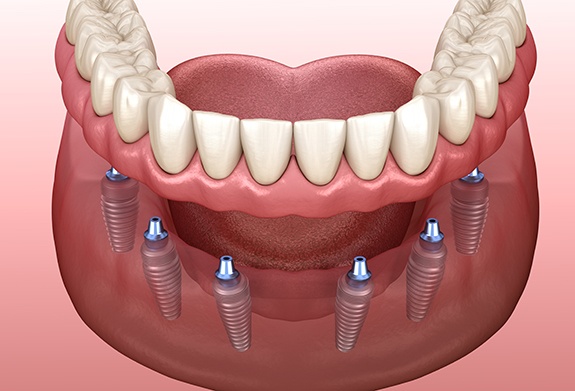
If you’re worried about an unreliable restoration or are seeking a longer-term solution for tooth loss, you might be a good candidate for implant dentures. This treatment involves placing anywhere from four to eight dental implants in your jaw to anchor your prosthetics.
This option involves oral surgery, so it’s usually pricier than the traditional method. However, once your jawbone fuses with your implants, they’re essentially a permanent part of your smile and are less likely to be damaged, destabilized, or dislodged. Plus, they can last 10 to 20+ years if cared for correctly, making them an excellent investment over time.
Does Dental Insurance Cover Dentures?

It’s natural to wonder whether your dental insurance policy will help pay for your new dentures, but it depends on your policy. Many plans include about 50% of the cost or these restorations, but there are no guarantees. Furthermore, there might be other restrictions to be aware of, like a waiting period that must pass before benefits kick in.
If you’re unsure whether your insurance will help cover your restoration, please let us know. Our friendly staff are familiar with different policies and are happy to help you maximize your available benefits.
Other Options for Making Dentures Affordable

Dental insurance can be a simple and effective way to reduce the out-of-pocket expenses required to rebuild your smile, but our team in Montpelier understands that not everyone carries a policy. We also believe that everyone deserves to have a functional, beautiful smile they can feel proud of, regardless of their finances and current dental condition.
If you’re afraid you can’t afford dentures, you can apply for a flexible financial plan through CareCredit. If approved, this allows you to divide the total owed into more manageable installments over a designated period that are easier on your wallet.
Denture FAQs
What is the Average Age for Dentures?
It’s natural to wonder whether or not you’re the appropriate age for dentures, but the truth is, there’s no age restriction on replacing missing teeth. Whether you contracted disease or decay that destabilized your pearly white(s), or suffered physical trauma that dislodged them, you might require one of these restorations at any point in your life.
With that said, tooth loss does tend to impact seniors more than younger adults. For example, about 66% of patients between 40 and 64 years old are missing at least one tooth, compared to only about 33% of adults between 20 and 39 years old. Not only that, but the American Dental Association has found that over half of people aged 65 to 74 already wear some form of dentures.
Can I Sleep with Dentures?
Are you curious whether it’s simpler to just sleep in your dentures rather than remove them at night? This might be acceptable on occasion, but it’s not usually recommended. Your restoration creates a firm suction against your gums to remain in place all day, which reduces circulation to your connective tissues. This can result in sores that make it uncomfortable to wear your new teeth, and can also increase your vulnerability to periodontal problems and other infections.
It's best to remove your dentures to thoroughly brush them at night, then leave them to soak in a glass of water or special cleaning solution that won’t be abrasive to the materials.
Is it Hard to Talk with Dentures?
Many patients in Montpelier have questions about whether their replacement teeth will cause speech impediments. It can take your mouth about a month to adjust to their presence, and you might develop a lisp or slur in that time. Fortunately, with time, patience, and practice, it’s entirely possible to overcome these challenges so you can be more easily understood.
You might find it helpful to try reading out loud to yourself at home, where you don’t have to worry about being judged for mistakes, to rehearse troublesome sounds and words until you feel more confident in your enunciation.
What Can’t I Eat with Dentures?
Although these restorations restore a portion of your original bite force, you must make conscientious dietary decisions to avoid damaging or dislodging them. For instance, sticky foods like gummy candies or peanut butter can pull them out of place, and hard snacks like nuts, popcorn, or raw fruits and veggies can sometimes be difficult to bite into and chew.
Some foods, like tough meats, can still be enjoyed, but you may have to cut your portion into smaller pieces that can be mashed up more easily in your mouth.
